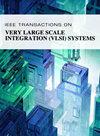ReTern: Exploiting Natural Redundancy and Sign Transformations for Enhanced Fault Tolerance in Compute-in-Memory-Based Ternary LLMs
IF 3.1
2区 工程技术
Q2 COMPUTER SCIENCE, HARDWARE & ARCHITECTURE
IEEE Transactions on Very Large Scale Integration (VLSI) Systems
Pub Date : 2025-07-08
DOI:10.1109/TVLSI.2025.3585043
引用次数: 0
Abstract
Ternary large language models (LLMs), which use ternary precision weights and 8-bit activations, have demonstrated competitive performance while significantly reducing the high computational and memory requirements of full-precision LLMs. The energy efficiency and performance of ternary LLMs can be further improved by deploying them on ternary computing-in-memory (TCiM) accelerators, thereby alleviating the von-Neumann bottleneck. However, TCiM accelerators are prone to memory stuck-at faults (SAFs) leading to degradation in model accuracy. This is particularly severe for LLMs due to their low weight sparsity. To boost SAF tolerance of TCiM accelerators, we propose ReTern that is based on 1) fault-aware sign transformations (FASTs) and 2) TCiM bitcell reprogramming exploiting their natural redundancy. The key idea is to use FAST to minimize computation errors due to SAFs in +1/−1 weights, while the natural bitcell redundancy is exploited to target SAFs in 0 weights (zero-fix). Our experiments on BitNet b1.58 700M and 3B ternary LLMs show that our technique furnishes significant fault tolerance, notably ~35% reduction in perplexity on the Wikitext dataset in the presence of faults. These benefits come at the cost of <3%, <7%, and <1% energy, latency, and area overheads, respectively.利用自然冗余和符号转换来增强基于内存计算的三元llm的容错性
使用三元精度权值和8位激活的三元大型语言模型(llm)已经展示出具有竞争力的性能,同时显著降低了全精度llm的高计算和内存需求。通过将三元llm部署在三元内存计算(TCiM)加速器上,可以进一步提高其能源效率和性能,从而缓解冯-诺伊曼瓶颈。然而,TCiM加速器容易出现内存卡故障(saf),导致模型精度下降。这对于llm来说尤其严重,因为它们的权重稀疏性很低。为了提高TCiM加速器的SAF容错性,我们提出了基于1)故障感知符号转换(fast)和2)利用其自然冗余的TCiM位元重编程的ReTern。关键思想是使用FAST来最小化由于+1/ - 1权重的SAFs引起的计算错误,同时利用自然的位元冗余来瞄准0权重的SAFs(零修复)。我们在BitNet b1.58 700M和3B三元llm上的实验表明,我们的技术提供了显著的容错性,特别是在存在故障的情况下,Wikitext数据集的困惑度降低了约35%。这些好处的代价分别是<3%、<7%和<1%的能量、延迟和面积开销。
本文章由计算机程序翻译,如有差异,请以英文原文为准。
求助全文
约1分钟内获得全文
求助全文
来源期刊
CiteScore
6.40
自引率
7.10%
发文量
187
审稿时长
3.6 months
期刊介绍:
The IEEE Transactions on VLSI Systems is published as a monthly journal under the co-sponsorship of the IEEE Circuits and Systems Society, the IEEE Computer Society, and the IEEE Solid-State Circuits Society.
Design and realization of microelectronic systems using VLSI/ULSI technologies require close collaboration among scientists and engineers in the fields of systems architecture, logic and circuit design, chips and wafer fabrication, packaging, testing and systems applications. Generation of specifications, design and verification must be performed at all abstraction levels, including the system, register-transfer, logic, circuit, transistor and process levels.
To address this critical area through a common forum, the IEEE Transactions on VLSI Systems have been founded. The editorial board, consisting of international experts, invites original papers which emphasize and merit the novel systems integration aspects of microelectronic systems including interactions among systems design and partitioning, logic and memory design, digital and analog circuit design, layout synthesis, CAD tools, chips and wafer fabrication, testing and packaging, and systems level qualification. Thus, the coverage of these Transactions will focus on VLSI/ULSI microelectronic systems integration.

 求助内容:
求助内容: 应助结果提醒方式:
应助结果提醒方式:


